Gain real-world experience in UNCP's Clinical Learning Center (CLC). This 14,500-square-foot facility has seven labs for you to learn in. Each one is state-of-the-art and designed to replicate real-life settings and challenges you'll face in the field. Get experience in everything from advanced care to maternal/child care. With the latest technology and hands-on simulations, the CLC helps you build confidence to care for patients of all ages.
The McKenzie-Elliott School of Nursing
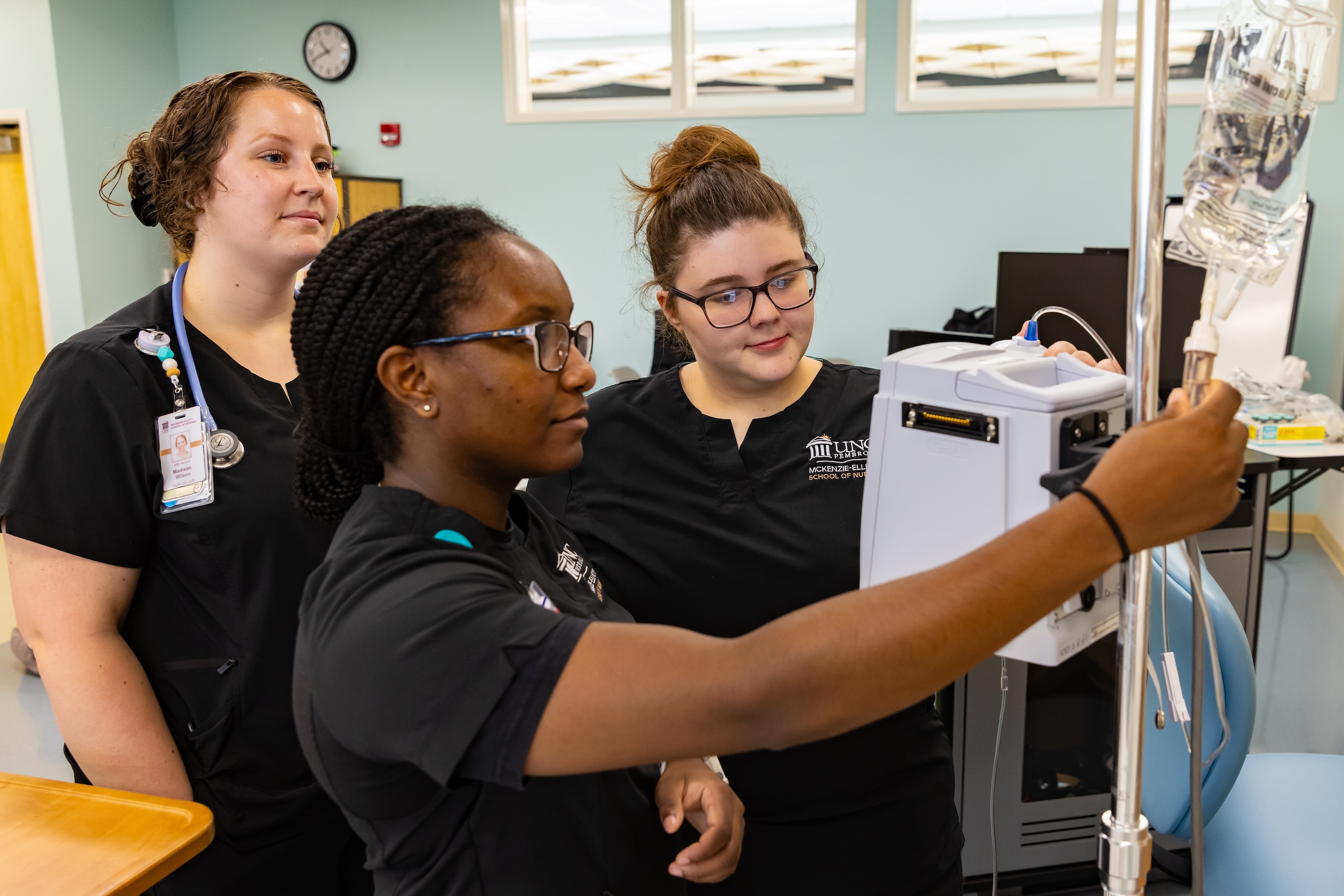
At the McKenzie-Elliott School of Nursing, we prepare compassionate, culturally aware professionals to lead in today's evolving healthcare landscape. Our programs blend academic excellence, clinical experience and a deep commitment to service. Whether you're starting or advancing your career, our nursing degrees offer a transformative education rooted in hands-on learning and community impact.
Program Highlights

Nationally Ranked. Personally Focused.
Serving the Community
First Time NCLEX Pass Rates
Academic Programs
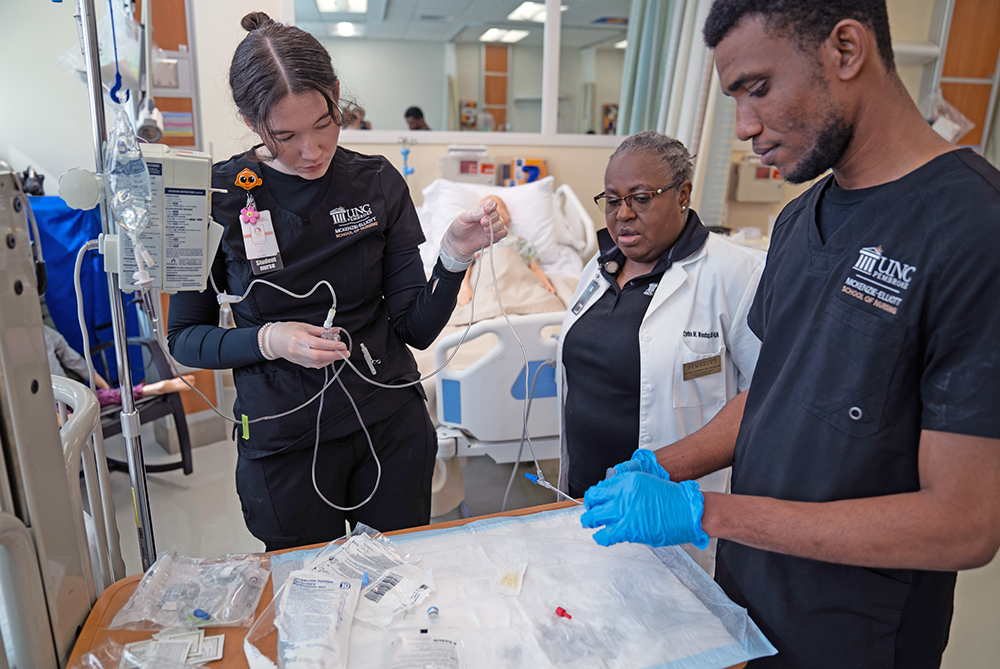
Prelicensure BSN
Our pre-licensure Bachelor of Science in Nursing program is a four-year, in-person pathway that prepares students for initial licensure as registered nurses. The curriculum is delivered in two phases and provides a strong foundation in clinical practice, leadership and patient-centered care. Each fall, a new cohort of approximately 50 students is admitted, ensuring a supportive and focused learning environment.
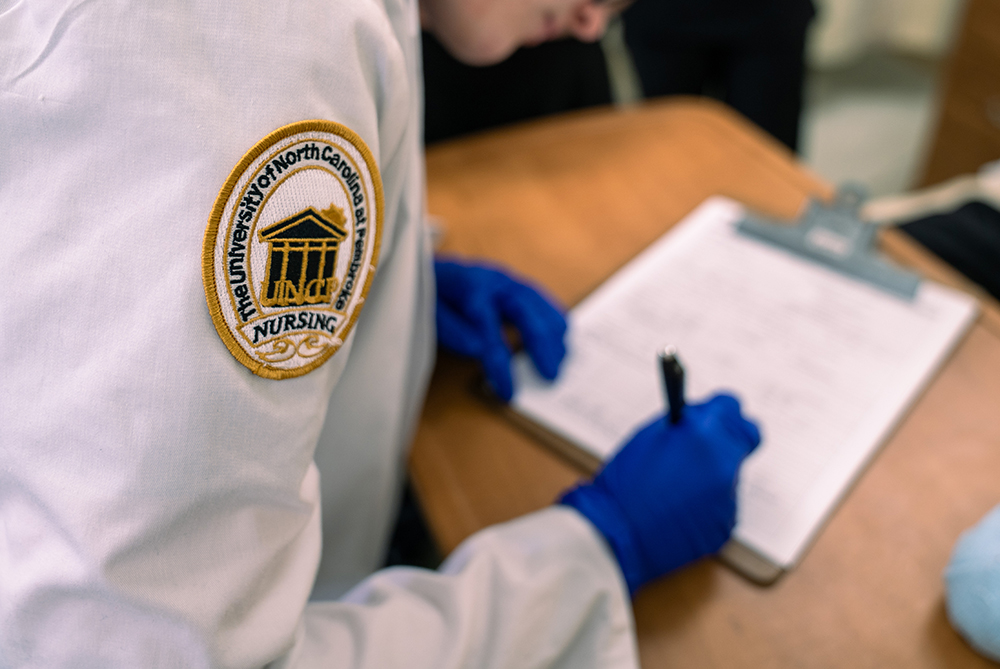
RIBN
The Regionally Increasing Baccalaureate Nurses (RIBN) program is a statewide dual-degree pathway that allows students to earn both an Associate Degree in Nursing (ADN) and a Bachelor of Science in Nursing (BSN). Designed for graduating high school seniors and early college students, RIBN combines the strengths of community college and university nursing education — offering an affordable, seamless route to a four-year nursing degree.
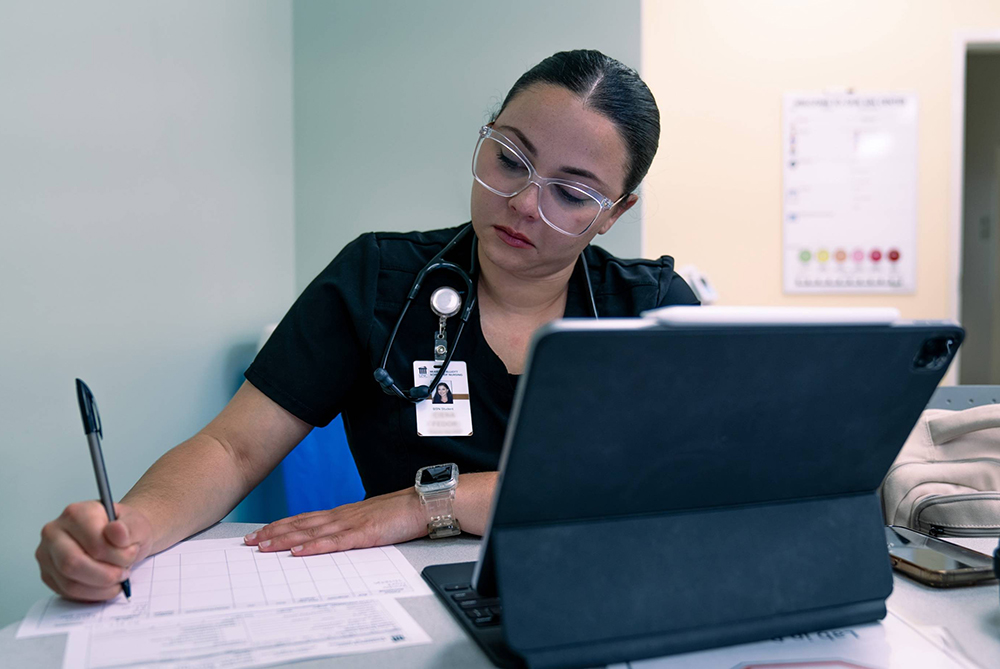
RN-BSN

MSN
Master of Science in Nursing
Our online MSN program is designed for registered nurses with a bachelor's degree who are ready to advance their careers. This 39-credit graduate program offers the flexibility of online coursework combined with hands-on practicum experiences.
You'll build specialized expertise while strengthening your skills in leadership, theory and evidence-based practice — preparing you to make a broader impact in today's evolving healthcare landscape.

DNP
Doctor of Nursing Practice
DNP-prepared nurses are equipped to translate research into real-world practice — reducing healthcare costs, improving outcomes and increasing patient satisfaction. With a specialized focus in population health, this program prepares you to lead initiatives in chronic care management, quality and safety, public health and health policy, making a measurable difference at the systems level.
*The Doctor of Nursing Practice program at UNCP is pursuing initial accreditation by the Commission on Collegiate Nursing Education, 655 K Street NW, Suite 750, Washington, DC 20001, 202-887-6791. Applying for accreditation does not guarantee that accreditation will be granted.
Rooted in Purpose.
We believe that persons, existing as individuals, families, groups and communities, are complex and diverse biological, psychological, social, cultural and spiritual beings. Humans are unique, possess dignity, worth, respect and have the capacity for compassion and caring for others and the right to self-determination. Humans have the right of choice; thus, they are accountable for their actions. As continually developing beings, humans adapt to or modify an ever-changing environment as they strive toward a state of self-actualization.
We believe that persons live in and interact with the environment and each is affected by the other. The environment is the totality of all conditions and circumstances that surround and have an impact on the development and adaptive functions of individuals, families, groups and communities. The interrelationships of factors in the environment, both internal and external to individuals, families, groups and communities, create a milieu in which these systems grow and change; thus, influencing their state of health.
We believe that health is an essential ingredient for optimal quality of life. Health is a dynamic state of being influenced by biological, psychological, social and cultural factors. Humans take deliberate actions to accomplish health goals, to achieve a high-level of well-being and to care for self and /or others. Well-being is a perception of health and human existence and is influenced by lifestyles and human experiences within the context of culture and society. Attaining and maintaining health and well- being are the responsibility of a society and its members as a whole. Every individual, family, group and community has the right to access nursing and health care within the parameters of available health resources.
We believe that nursing is an esthetic art, a scientific discipline and a practice profession accountable to society for responding to its health needs. Nursing is characterized by providing unique, specialized and caring health services, in collaboration with individuals, families, groups and communities, for the promotion, maintenance and restoration of optimal health and well-being.
We believe that professional nursing is a dynamic process that evolves as the nurse intervenes and addresses needs of individuals, families, groups and communities. Professional nursing includes interrelated theoretical and practice components. The theoretical component involves the synthesis and application of knowledge from nursing, physical, social, biological and behavioral sciences as well as the humanities. Critical thinking, clinical inquiry and decision-making, and effective interpersonal, oral, written and technological communication strategies and psychomotor skills characterize the practice component. Professional nurses function independently and interdependently in a variety of settings and are ethically and legally accountable for the quality of their practice. The professional nurse practices in the roles of provider of care, designer/manager/coordinator of care and member of a profession to continuously improve client outcomes through system effectiveness and individual performance.
We believe that professional nursing education, built on a foundation of liberal arts, sciences and humanities, guides the learner to attain competencies required for professional nursing practice. Nursing education acknowledges that learners are a student population with diverse cultural backgrounds, learning styles, abilities, educational experiences and life and work experiences. The design of the nursing program recognizes learner's previous education, life and work experiences as well as individual student values. During the educational process, students have multiple opportunities to enhance their self-awareness; to promote professional identification, commitment and collegiality; to synthesize and apply knowledge; to be introduced to and build upon psychomotor skills; and to internalize the results of changes in attitudes, values, thoughts and behaviors. Baccalaureate education prepares graduates to function as generalists in any healthcare setting while master's level nursing education “provides graduates with a fuller understanding of nursing in order to engage in higher level practice and leadership in a variety of settings” (AACN, 2010, p. 4). Education is a life-long process and it is the responsibility of each professional nurse to seek life-long educational opportunities.
We believe that learning is a dynamic process that results in a change in attitude, values, thoughts and behavior. Each student is unique and learning is influenced by needs, style of learning, age and past experiences. The student is responsible for learning and must be self-directed and motivated for learning to occur. Learning occurs through the development of critical thinking, active inquiry, clinical decision-making and active participation in the educational process. Faculty has the responsibility to design learning activities that are innovative, multi-sensory and progressing from simple to complex. Faculty and students share the responsibility for creating an educational climate that fosters intellectual inquiry, freedom of expression, critical thinking and creativity and facilitates the development of learner potential. In the teaching/learning process, faculty is responsible for functioning as facilitators, resource persons and role models, providing educational opportunities for the nursing profession without regard to race, age, creed, color or national origin.
The McKenzie-Elliott School of Nursing builds on a rich heritage that began with the establishing of the Southeastern North Carolina Nursing Consortium in 1992, a joint RN-BSN completion program between UNCP and Fayetteville State University. The program was established to increase access to baccalaureate education for registered nurses who had graduated from associate degree nursing programs and hospital-based programs, to increase the number of minority nurses with BSNs and to respond to the health care needs of citizens in the most underserved area of southeastern North Carolina. The Consortium separated August 1, 2004; at that time, the UNCP baccalaureate nursing program transitioned to a Department of Nursing within the University structure. The Department of Nursing is housed in the new state-of-the-art Weinstein Health Sciences Building on the campus of UNCP.
In September 2004, the North Carolina Board of Nursing granted initial approval for the new pre-licensure BSN option to admit its first students in July 2005. The Board of Nursing approved 200 student positions for the pre-licensure BSN option. Since 2005, UNCP has offered RN-BSN completion and pre-licensure BSN educational programs in response to the critical need for baccalaureate-prepared nurses not only at the national and state level but also in southeastern North Carolina.
In February 2013, the UNC Board of Governors approved UNC Pembroke's proposal to offer a Master of Science in Nursing program and to admit the first class of graduate students in fall 2013. The program offers three concentrations: nurse educator, clinical nurse leader and rural case manager. The graduate coursework is offered through a combination of classroom and practicum experiences; the classroom portion is a combination of face-to-face and computer-mediated learning activities.
In April 2021, the university received a $6 million planned gift, the second largest in the university's history, from former trustee Mary Ann Elliott to the Department of Nursing. That same month, the Board of Trustees approved transitioning the Department of Nursing to the McKenzie-Elliott School of Nursing.
The McKenzie-Elliott School of Nursing is dedicated to carrying out the mission of the College of Health Sciences and the University of North Carolina at Pembroke. As an integral academic unit of the University, the McKenzie-Elliott School of Nursing is committed to the tripartite roles of teaching, research and community service that contribute to the cultural, intellectual and social development of professional nurses in North Carolina and the nation. Our nursing program is grounded in evidence-based practice and emphasizes interprofessional education, cultural competency and lifelong learning.
The primary purposes of the McKenzie-Elliott School of Nursing program are to (a) provide accessible, seamless, high-quality undergraduate and graduate nursing education to diverse student populations in order to create leaders in professional nursing practice, and (b) prepare graduates to provide high-quality, cost-effective professional nursing services to improve health across the life span for individuals, families, groups and communities.
The McKenzie-Elliott School of Nursing strives to achieve regional distinction as a leader of excellence in nursing education, scholarship, service and community engagement. Our nursing program fosters interprofessional relationships and teamwork and prepares graduates who are committed to advancing the nursing profession and improving health outcomes for all.

Cutting-Edge Simulations
For Real-World Care
Outreach & Experiential Learning
UNCP's commitment to rural public health extends well beyond campus with its Mobile Health Unit , also known as the “Clinic on Wheels.” Featured on PBS, the mobile unit travels to remote and underserved communities across southeastern North Carolina — including areas with high American Indian populations — to offer primary care screenings, vaccinations, health education and disease prevention services.
Accreditation
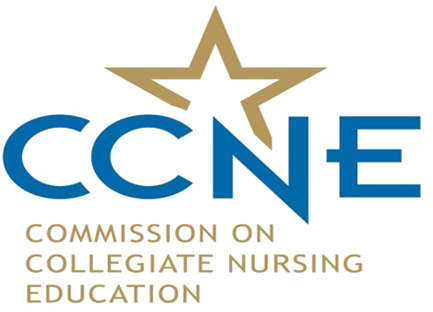
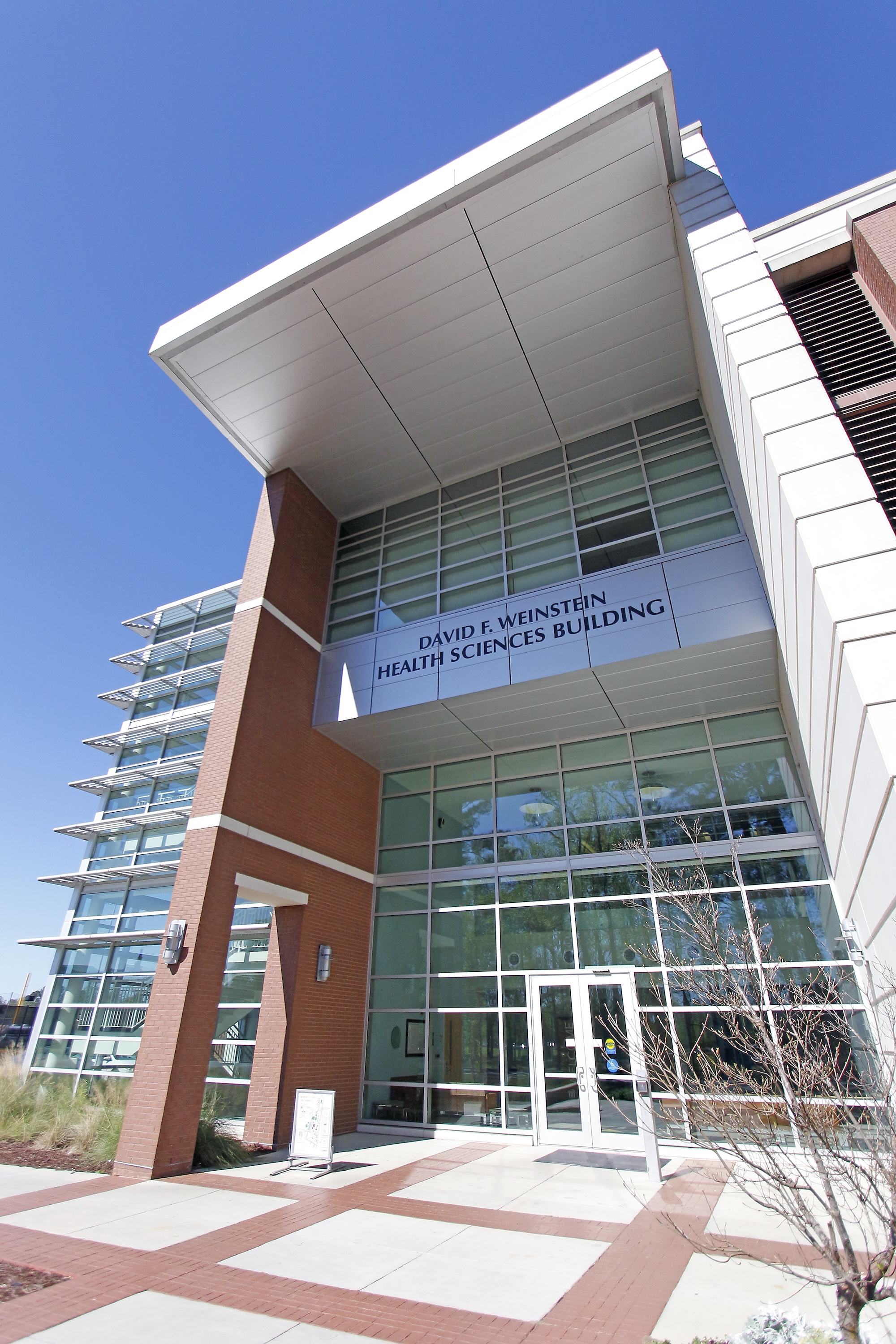
Department Chair

Jennifer Jones Locklear
Chair and Associate Professor of Nursing and Pre-Licensure Director
jennifer.jones-locklear@uncp.edu910.521.6747

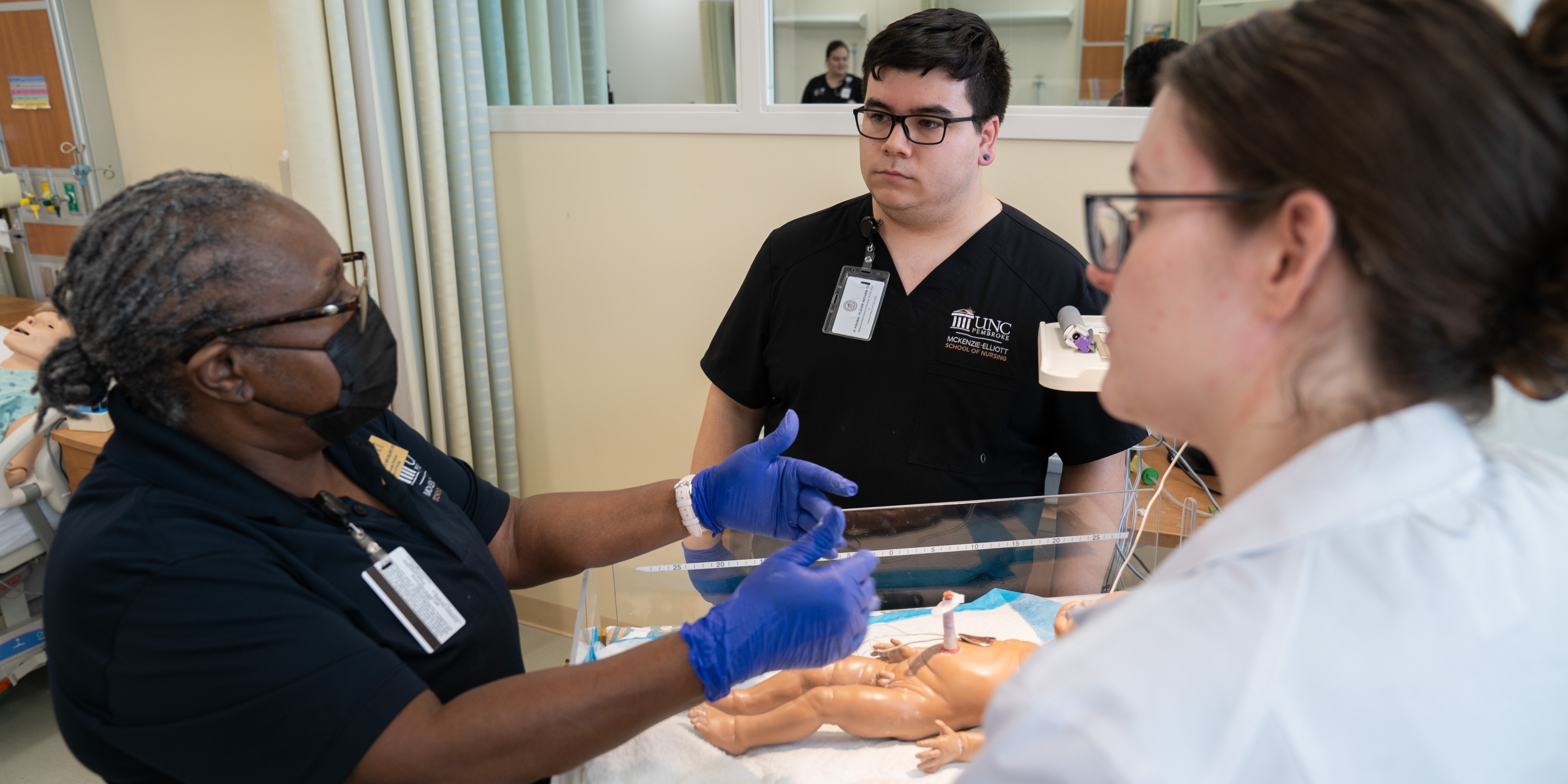
Connect With Us
Weinstein Health Sciences Building, Room 340A
PO Box 1510
Pembroke, NC 28372
Phone: 910.775.4447
Fax: 910.521.6178
nursing@uncp.edu
Nursing in the News
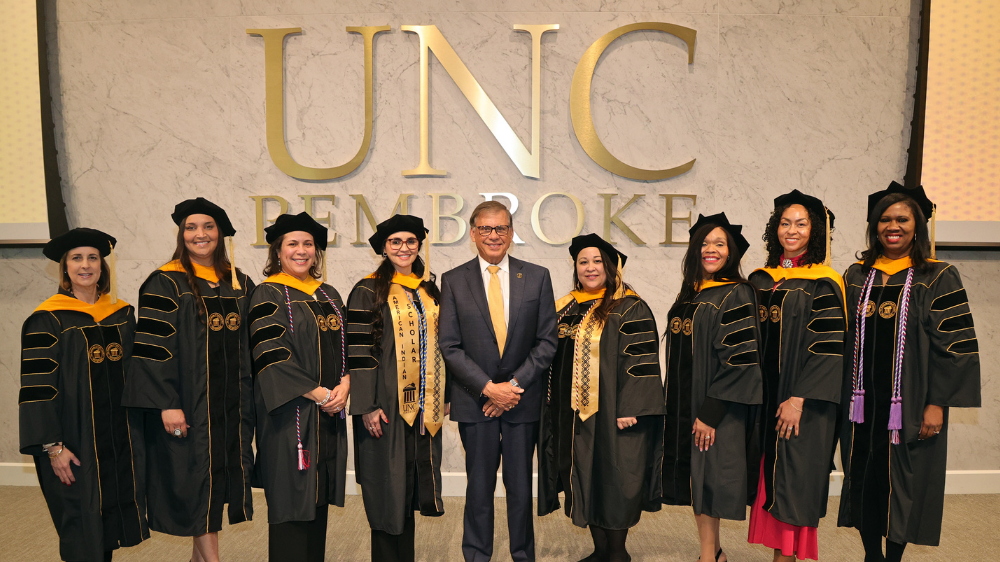
UNCP Awards First Doctoral Degrees, Marking a New Chapter in University History
As the lights rise inside Givens Performing Arts Center tonight, eight nurse leaders will step onto the stage and into the history books. Their doctoral hoods, symbols of perseverance, scholarship and service, mark a moment 138 years in the making for the University of North Carolina Pembroke.
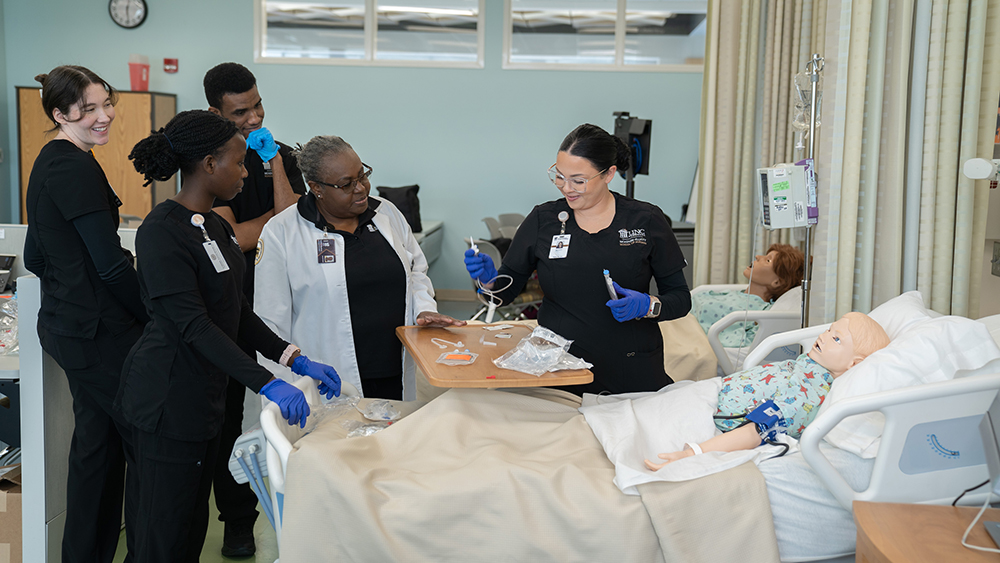
McKenzie-Elliott School of Nursing Receives 10-Year CCNE Accreditation
The McKenzie-Elliott School of Nursing at UNC Pembroke has been granted a full 10-year accreditation for its Bachelor of Science in Nursing (BSN) program by the Commission on Collegiate Nursing Education (CCNE), which will extend through June 30, 2035.
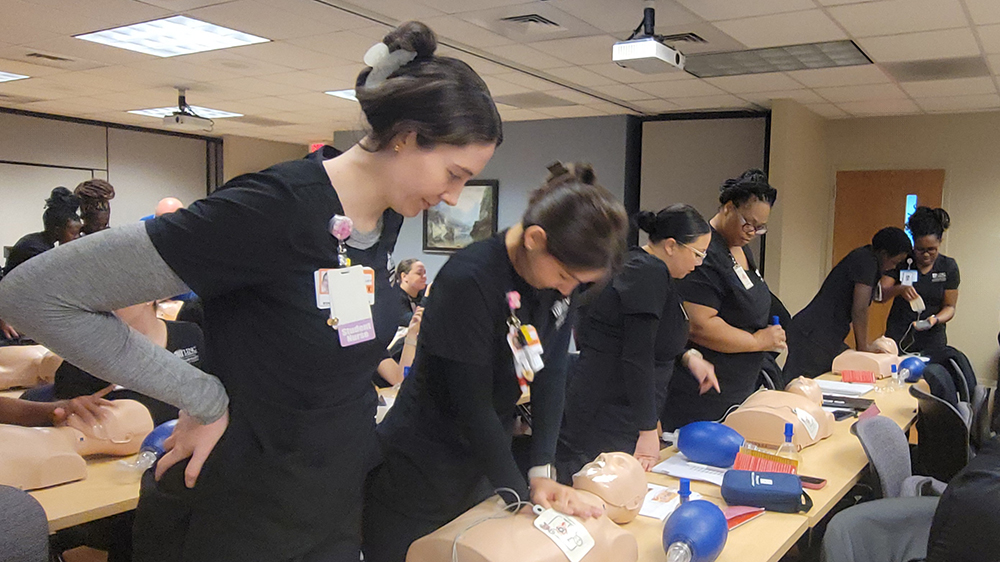
UNCP, Scotland Health Care Partnership Enables Nursing Students To Gain Critical Life-Saving Skills
A new partnership between the McKenzie-Elliott School of Nursing at UNC Pembroke and Scotland Health Care System is providing nursing students with more than just classroom knowledge — it’s providing life-saving skills and a competitive edge through Advanced Cardiovascular Life Support (ACLS) certification training.
Important Notice: Admission to UNCP does not guarantee acceptance into the BSN nursing program. All prospective BSN nursing students must submit a supplemental application and meet program-specific admission requirements.
